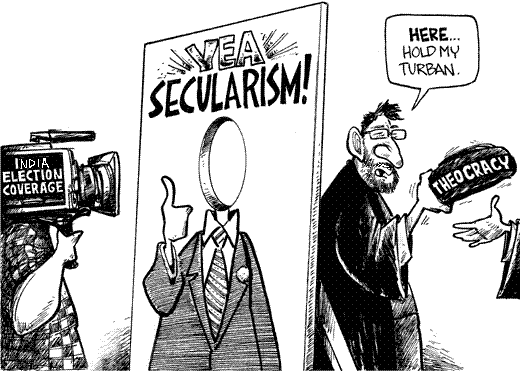
Fanatical Secularism?
Secularism is the belief that government or other entities should exist separately from religion and/or religious beliefs.
In one sense, secularism may assert the right to be free from religious rule and teachings, and the right to freedom from governmental imposition of religion upon the people within a state that is neutral on matters of belief. In another sense, it refers to the view that human activities and decisions, especially political ones, should be unbiased by religious influence. Some scholars are now arguing that the very idea of secularism will change. [Link]
That is how Wikipedia describes secularism. There is an India specific section describing secularism as –
The Preamble to the Constitution of India declares that India is a secular state. The original preamble did not mention the word “secular”. It was added later by 42nd amendment in 1976. The term secularism in politics refers to the governmental practice of indifference towards religion. Though such bifurcation is not totally possible, still, secular politics attempt to prevent religious philosophies or bodies from influencing governmental policies. The philosophy that the Indian constitution upholds is a kind of secular humanism made relevant through a historical development of the ideology within the context of religious pluralism in India. [Link]
It is admitted that politics cannot be completely isolated from religion or religious beliefs but secular politics strives to separate government policy making from being influenced by religion. We hear almost every politician and self described secularists swear by this principle. Yet what has transpired since our independence is contrary to this. Secular principles have been abandoned at the slightest hint of threat from religious groups. We saw this in the Shah Bano case where a court verdict based on secular law was subverted by letting religion influence changes in law. We see this principle being jettisoned routinely the moment vote banks revolt on religious pretexts.
If a secular state is supposed to be agnostic on the matters of religion then the Indian state describing itself as such is an anomaly. In fact the Indian state contradicts the Indian Constitution to an extent that necessitates re-evaluating inclusion of the word “secular”.
One could cite the articles for fundamental rights in the constitution allowing freedom and propagation of religion. That is certainly the argument of religious groups. These freedoms have led to varied interpretations by secularists and the courts alike resulting in heated debates between various groups. The continual bowing down of the state on matters of religion and the manner in which this has been done has completely altered the purported meaning and intent of secularism. Secularism in India has been watered down to such an extent that it has now attracted the label “pseudo secularism”. Champions of Indian secularism have had a great part to play in this. On every occasion self described secularists have exploited the concept to further their own narrow agendas. This is evident from the fact that under secular campaigns only one set of groups have benefitted almost always. Having seen this go on for years a feeling of resentment has set in among those adversely affected by secularism. When religious institutions of one group benefit at the expense of the other, when certain institutions enjoy immunity while other institutions are constantly under scrutiny and state interference, when predatory proselytising techniques enjoys secular sanction secularism acquires a fanatical character. The heated disputes and confrontations between the affected parties is an example of how fanatical secularism has driven a wedge between communities.
Wikipedia also says this –
Under feudal system there was no competition between different religious traditions as authority resided in sword and generally there were no inter-religious tensions among the people of different religions. They co-existed in peace and harmony though at times inter-religious controversies did arise. However, there never took place bloodshed in the name of religion.
…
In a multi-religious society, if politics is not based on issues but on identities, it can prove highly divisive. Politicians are tempted to appeal to primordial identities rather than to solve problems. The former case proves much easier. The medieval society in India was thus more religiously tolerant as it was non-competitive. The modern Indian society, on the other hand, has proved to be more divisive as it is based on competition. [Link]
It is not too difficult to see that predatory proselytisation is seen as a competition and threat by the affected communities. A diverse country like India cannot afford this threat. When fanatical secularism is invariably seen to favour one set of groups and when these groups flourish at the expense of others, discontent brews. When fanatical secularism refuses to address this discontent, it manifests in unpredictable ways, including violence. As you can see from the Wikipedia entry religious competition has threatened peaceful coexistence of various communities in India. Fanatical secularism aids religious competition favouring one set of groups at the expense of other. Fanatical secularism drives a wedge between communities and it is a threat to our national integrity.
Image courtesy: India Today